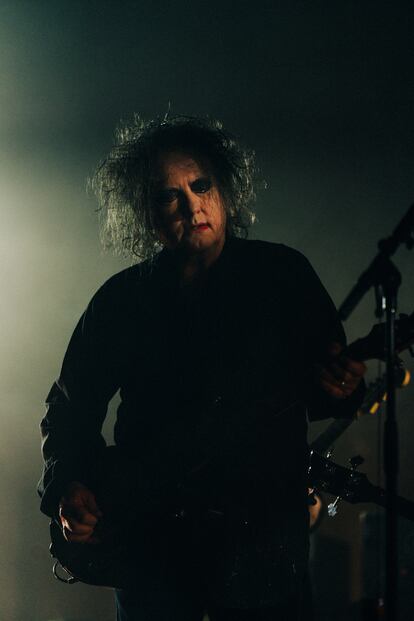The eternal teenagers who enjoy their existential agony locked in the room, on the bed, while the voice of Robert Smith plays, know that behind each apparently gloomy song by The Cure there is a pat on the back and a message of encouragement.
The band, which endures as the definitive symbol of the sinister wave and afterpunk English singer for more than four decades, started his only concert of the year this Friday, at the legendary London venue Troxy, with Alonethe star song of his new album, Songs Of a Lost World. A wonderful twilight ballad in which Smith, 65, begins to face his life phase: “This is the end of every song we sing in solitude,” he says at the beginning.
But almost three hours after an intense, impeccable and generous live show, the band says goodbye to its thousands of followers with the Boys Don´t Crythe anthem with which an entire generation of renegades and misfits learned to face life. You have to close your eyes. Keep them closed for a long time and limit yourself to listening to the voice, just as fresh, with the same melancholic, precise and complicit tone from almost forty years ago, to understand why The Cure continues to fill theaters.
Hundreds of thousands of people were also able to follow the performance on the band’s YouTube channel, where it is still posted.
Robert Smith, the permanent nucleus of a group whose members have not stopped rotating – only bassist Simon Gallup remains next to him, walking around the stage from side to side with the bass at knee height – is a musician exceptional. But above all it is an icon. His tangled black hair, the parting in his eyes and his painted lips became over time the image of the hopelessly romantic teenager. They were inspired by him Edward Scissorhands by Tim Burton or Allison, the lonely and introverted girl from the cult film The Breakfast Club.
Time has taken its toll on the physique of the group’s composer and guitarist, but his musical talent remains intact and renewed for the hundreds of fifty-year-olds who appeared at the Troxy – the venue, an old cinema art decohas a limited capacity—and for many other young people of a generation that has also appropriated the main themes of The Cure.
a lost world
Smith sang in one go, and in the order in which they were released, the eight songs from the new album, the first the band has released in sixteen years. The reviews have been unanimously generous, almost enthusiastic, with a work that has reminded many of that work of art that was Disintegrationthe 1989 LP.
Along with the entry theme, Aloneothers like A Fragile Thing They recall the languid romanticism that seduced so many of the group’s followers at the time. All I Ever Am explains Smith’s success among the casualties, but also among those who are not. Because the same thing was entangled in a web of extensive and melancholic sounds that when you hear them you don’t want to escape, which produced melodies and rhythms of the catchiest pop that has emerged from the United Kingdom.

It is paradoxical that the new album evokes a “lost world”, because just after a 15-minute intermission – just enough to relieve the prostates of an entire generation and refill their pints of beer – The Cure re-emerged on the scene with a vitality, a commitment and professionalism that made it clear that these musicians have not lost an iota of their enormous quality. Smith, dressed in black from top to bottom – his trademark – constantly changed guitars and gave no respite to the rest. Not one of the classics was missing. Lullaby, Pictures of You, Close To Me, Just Like Heaven, Why Can´t I Be You, A Forest…
Smith is not Mick Jagger. Dancing, what is called dancing, is not his thing. But as the concert progressed, he was encouraged to open his arms in a cross, swing his head, look at the sky and adopt that attitude of existential anguish with which he manages to embroider his performances.
Farming sheep in Sussex
He finally seems comfortable with his skin. The very image of the tormented being is actually a man happily married for 36 years to his teenage sweetheart, Mary Poole (with whom he dances under the moon in the video of Lovesong“every time we are alone, I feel complete again”). He is a meticulous musician who lives in Sussex and likes to keep sheep, and accumulate songs for several more albums.
And he is an artist whom his followers idolize, whom critics continue to take seriously and whom many consider a national treasure: “I have discovered the cure – The Cure – for a broken Britain,” he titled his song with that play on words. column in the newspaper The Telegraph journalist Ben Lawrence. “It is time to seek solace in the sublime creativity and laconic wisdom of Robert Smith. In 1989 he was my hero; in 2024 it could be yours,” suggests Lawrence.
For many of those gathered this Friday at the Troxy, Smith may not be a hero, but he remains the pleasant memory of many hours of pleasurable suffering locked in his room, and the reaffirmation of the immense talent and quality of a band that marked an era. musical and a way of understanding life that continues to seduce today’s teenagers.

